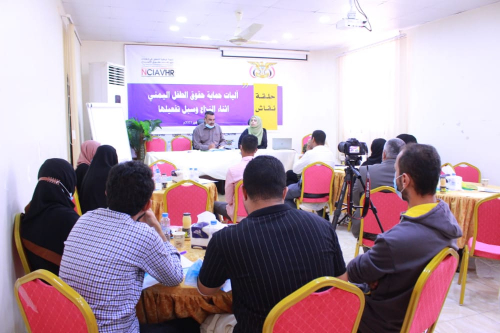Seyaj warned of the growth rates of domestic abuse and grave violations of international law against children in light of the seven-year-long war, amid a lack of justice or recourse for the victims.
In a working paper entitled “Yemen: A Childhood in Hell,” the organization said that the continuation of the war and the frailty of law enforcement and child protection institutions have all directly contributed to children’s poor access to justice, leading to the continuation and growth of crimes and violations against them.

Seyaj affirmed that perpetrators of crimes against children in Yemen are still exempt from punishment due to many factors, the foremost of which is the monopoly of armed militias–the biggest violator of children’s rights–over security and judicial institutions. The militias, who hold sway over the majority of the Republic’s land, conduct their business in a way that strengthens their position and contributes to the disruption of institutions dedicated to the care and protection of children.
On the occasion of International Child Rights Day 2021, Seyaj stated that rates of sexual assault had risen substantially and unprecedentedly. It went on to say that many young soldiers are sexually abused, including by family members.
In a panel discussion hosted by the National Committee for Investigation of Human Rights Violations, Seyaj member Reem Al-Fadhli’s paper discussed several violations and crimes against children, foremost of which is the killing, maiming, recruitment, and sexual exploitation of children, and the derailing of children’s education.
According to Seyaj, the militarization of security and judicial institutions has caused them to be inextricably linked to armed militias. Because these militias are the biggest violators of children’s rights, these aligned institutions have sought and continue to seek to obstruct redress for victims.
The organization emphasized that the absence of justice for child victims now will be just as disastrous and detrimental in the future as physical injuries, as children will bear the brunt of the psychological and social damage for years to come. They might suffer impairments, severed limbs, and physical scars, but the psychological harm caused by crimes and sexual assault might be even more grave.
According to Seyaj, the incapacitating bureaucratic conditions imposed by employees of some government agencies and institutions on national organizations, including child protection organizations, have rendered many of them incapable of carrying out their duties and exercising their role in child protection.
As national institutions are supposed to play the primary role in providing legal support, advocacy, and awareness, their failure to fulfill their roles directly contributes to the loss of children’s rights and the impunity of criminals.
a working paper: Arabic only
Issued by Seyaj Organization for Childhood Protection
November 26, 2021

